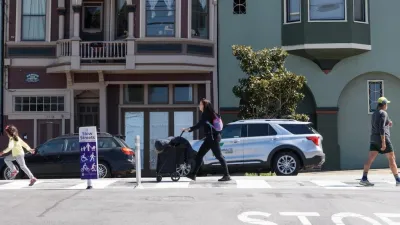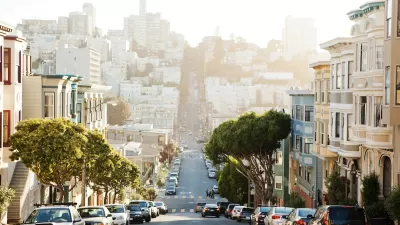San Francisco is looking for ways to manage—and protect—the masses of tourists who want to walk "the World's Crookedest Street."

In the residential Russian Hill neighborhood of San Francisco, one block draws an estimated 2 million pedestrians a year—the famously steep, winding stretch of Lombard Street.
In response to complaints from residents about traffic, noise, litter, and petty crime, the County Transportation Authority is studying ways to manage the crowds, SF Gate reports. After a year researching how other tourist destinations handle similar problems, the study is now exploring solutions—including barring cars and turning the area into a pedestrian-only plaza.
Other proposals include hiring a mass of parking and safety officers, requiring reservations, and charging a toll. Some tourists told the paper they would be willing to pay an admission fee, while at least one said pedestrians should visit for free and separately from cars.
FULL STORY: Turn for the worse on SF’s famous Lombard Street

Maui's Vacation Rental Debate Turns Ugly
Verbal attacks, misinformation campaigns and fistfights plague a high-stakes debate to convert thousands of vacation rentals into long-term housing.

Planetizen Federal Action Tracker
A weekly monitor of how Trump’s orders and actions are impacting planners and planning in America.

In Urban Planning, AI Prompting Could be the New Design Thinking
Creativity has long been key to great urban design. What if we see AI as our new creative partner?

King County Supportive Housing Program Offers Hope for Unhoused Residents
The county is taking a ‘Housing First’ approach that prioritizes getting people into housing, then offering wraparound supportive services.

Researchers Use AI to Get Clearer Picture of US Housing
Analysts are using artificial intelligence to supercharge their research by allowing them to comb through data faster. Though these AI tools can be error prone, they save time and housing researchers are optimistic about the future.

Making Shared Micromobility More Inclusive
Cities and shared mobility system operators can do more to include people with disabilities in planning and operations, per a new report.
Urban Design for Planners 1: Software Tools
This six-course series explores essential urban design concepts using open source software and equips planners with the tools they need to participate fully in the urban design process.
Planning for Universal Design
Learn the tools for implementing Universal Design in planning regulations.
planning NEXT
Appalachian Highlands Housing Partners
Mpact (founded as Rail~Volution)
City of Camden Redevelopment Agency
City of Astoria
City of Portland
City of Laramie





























